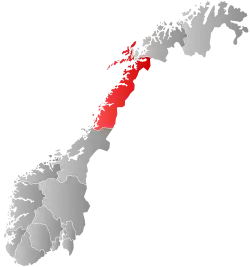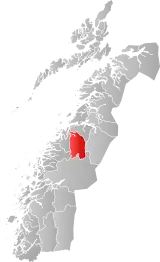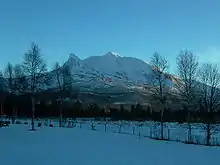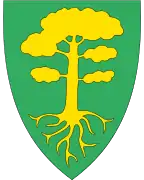Beiarn Municipality
Beiarn kommune | |
|---|---|
| Beiara herred (historic name) Beieren herred (historic name) | |
 | |
 Nordland within Norway | |
 Beiarn within Nordland | |
| Coordinates: 66°55′02″N 14°40′29″E / 66.91722°N 14.67472°E | |
| Country | Norway |
| County | Nordland |
| District | Salten |
| Established | 1853 |
| • Preceded by | Gildeskål Municipality |
| Administrative centre | Moldjord |
| Government | |
| • Mayor (2023) | Andrè Kristoffersen (Sp) |
| Area | |
| • Total | 1,222.30 km2 (471.93 sq mi) |
| • Land | 1,178.76 km2 (455.12 sq mi) |
| • Water | 43.55 km2 (16.81 sq mi) 3.6% |
| • Rank | #88 in Norway |
| Population (2023) | |
| • Total | 1,027 |
| • Rank | #332 in Norway |
| • Density | 0.9/km2 (2/sq mi) |
| • Change (10 years) | |
| Demonym | Beiarværing[1] |
| Official language | |
| • Norwegian form | Bokmål |
| Time zone | UTC+01:00 (CET) |
| • Summer (DST) | UTC+02:00 (CEST) |
| ISO 3166 code | NO-1839[3] |
| Website | Official website |
Beiarn is a municipality in Nordland county, Norway. It is part of the traditional district of Salten. Beiarn is also a part of the Bodø Region, a statistical metropolitan region. The administrative centre of the municipality is the village of Moldjord. Other villages in Beiarn are Høyforsmoen, Trones, and Tverrvika.
The 1,222-square-kilometre (472 sq mi) municipality is the 88th largest by area out of the 356 municipalities in Norway. Beiarn is the 332nd most populous municipality in Norway with a population of 1,027. The municipality's population density is 0.9 inhabitants per square kilometre (2.3/sq mi) and its population has decreased by 4.5% over the previous 10-year period.[4][5]
General information
The municipality of Beiarn was established in 1853 when it was separated from the large municipality of Gildeskål. Initially, Beiarn had 1,164 residents. The municipal boundaries have not changed since that time.[6]
Name
The municipality (originally the parish) is named after the Beiar Fjord (Old Norse: Beðir or Beðinn). The meaning of the name is uncertain. It may be derived from the plural form of the word beðr which means "bedding" (in the sense of a "river bed". Another option is that it is the past participle of the word biðja which means "to pray" or "to ask".[7] Historically, the name of the municiaplity was spelled Beieren. On 6 January 1908, a royal resolution changed the spelling of the name of the municipality to Beiara.[8] This spelling, however, was not well-liked. On 19 August 1908 (a few months later), another royal resolution changed the spelling of the name of the municipality to Beiarn.[9]
Coat of arms
The coat of arms has been used in Beiarn since 1988. The blazon is "Vert, a pine tree uprooted Or" (Norwegian: I gull en furu på grønn bunn). This means the arms have a green field (background) and the charge is a pine tree. The pine tree has a tincture of Or which means it is commonly colored yellow, but if it is made out of metal, then gold is used. The pine tree was chosen to symbolize the mighty pine forests for which Beiarn has historically been well-known. This is mentioned both by Petter Dass' "Nordlands Trompet" and in Lars Hess Bing's "Description of the Kingdom of Norway, the Isles of Iceland and the Faroe Islands, as well as Greenland". There are remains of giant pine trees that are likely over one thousand years old. The green color of the field was chosen to represent the lush green forests and the gold/yellow color was chosen because the forest is "worth its weight in gold" for the municipality. The arms were designed by Erik Gabrielsen, who was a cultural consultant in Beiarn municipality. In 1995, the municipality applied to have the arms formally approved for use by the National Archives of Norway, but they were not approved because it did not meet the heraldic standards for coats of arms in Norway. The National Archives told the municipality that they can use the unapproved arms in some circumstances, but they cannot be put on a flag, road sign, or public buildings.[10][11][12][13]
Churches
The Church of Norway has one parish (sokn) within the municipality of Beiarn. It is part of the Salten prosti (deanery) in the Diocese of Sør-Hålogaland.
| Parish (sokn) | Church Name | Location of the Church | Year Built |
|---|---|---|---|
| Beiarn | Beiarn Church | Moldjord | 1873 |
| Høyforsmoen Chapel | Høyforsmoen | 1957 |
A privately owned stave church was built in 2006 at Savjord, about 8 kilometres (5.0 mi) east of Moldjord. The Savjord Stave Church was modeled after the Gol Stave Church.
Geography

The municipality of Beiarn is located just north of the Arctic Circle, along the Beiar River including the Beiar Valley and some surrounding areas in the Saltfjellet mountains. The river is one of the best salmon rivers in Northern Norway. There are several large lakes in Beiarn including Arstaddalsdammen, Litle Sokumvatnet, and Ramsgjelvatnet.
The Saltfjellet–Svartisen National Park is partially located in Beiarn. The world's most northern naturally occurring elm forest (Ulmus glabra) grows in the Arstadlia nature reserve, where the rich vegetation also includes orchids.[14]
Government
All municipalities in Norway are responsible for primary education (through 10th grade), outpatient health services, senior citizen services, welfare and other social services, zoning, economic development, and municipal roads and utilities. The municipality is governed by a municipal council of directly elected representatives. The mayor is indirectly elected by a vote of the municipal council.[15] The municipality is under the jurisdiction of the Salten og Lofoten District Court and the Hålogaland Court of Appeal.
Municipal council
The municipal council (Kommunestyre) of Beiarn is made up of 15 representatives that are elected to four year terms. The tables below show the current and historical composition of the council by political party.
| Party name (in Norwegian) | Number of representatives | |
|---|---|---|
| Labour Party (Arbeiderpartiet) | 4 | |
| Centre Party (Senterpartiet) | 6 | |
| Beiarn Local List (Beiarn Bygdeliste) | 5 | |
| Total number of members: | 15 | |
| Party name (in Norwegian) | Number of representatives | |
|---|---|---|
| Labour Party (Arbeiderpartiet) | 3 | |
| Centre Party (Senterpartiet) | 9 | |
| Beiarn Local List (Beiarn Bygdeliste) | 3 | |
| Total number of members: | 15 | |
| Party name (in Norwegian) | Number of representatives | |
|---|---|---|
| Labour Party (Arbeiderpartiet) | 6 | |
| Centre Party (Senterpartiet) | 5 | |
| Beiarn Local List (Beiarn Bygdeliste) | 4 | |
| Total number of members: | 15 | |
| Party name (in Norwegian) | Number of representatives | |
|---|---|---|
| Labour Party (Arbeiderpartiet) | 7 | |
| Centre Party (Senterpartiet) | 4 | |
| Beiarn Local List (Beiarn Bygdeliste) | 4 | |
| Total number of members: | 15 | |
| Party name (in Norwegian) | Number of representatives | |
|---|---|---|
| Labour Party (Arbeiderpartiet) | 5 | |
| Centre Party (Senterpartiet) | 2 | |
| Beiarn local list (Beiarn bygdeliste) | 8 | |
| Total number of members: | 15 | |
| Party name (in Norwegian) | Number of representatives | |
|---|---|---|
| Labour Party (Arbeiderpartiet) | 7 | |
| Centre Party (Senterpartiet) | 2 | |
| Beiarn local list (Beiarn Bygdeliste) | 4 | |
| Rural development list (Bygdeutviklingslista) | 2 | |
| Total number of members: | 15 | |
| Party name (in Norwegian) | Number of representatives | |
|---|---|---|
| Labour Party (Arbeiderpartiet) | 8 | |
| Progress Party (Fremskrittspartiet) | 1 | |
| Centre Party (Senterpartiet) | 5 | |
| Beiarn local list (Beiarn bygdeliste) | 3 | |
| Total number of members: | 17 | |
| Party name (in Norwegian) | Number of representatives | |
|---|---|---|
| Labour Party (Arbeiderpartiet) | 7 | |
| Conservative Party (Høyre) | 1 | |
| Socialist Left Party (Sosialistisk Venstreparti) | 1 | |
| Joint list of the Centre Party (Senterpartiet) and the Christian Democratic Party (Kristelig Folkeparti) | 8 | |
| Total number of members: | 17 | |
| Party name (in Norwegian) | Number of representatives | |
|---|---|---|
| Labour Party (Arbeiderpartiet) | 7 | |
| Conservative Party (Høyre) | 2 | |
| Joint list of the Centre Party (Senterpartiet) and the Christian Democratic Party (Kristelig Folkeparti) | 7 | |
| Local people's list (Bygdefolkets liste) | 1 | |
| Total number of members: | 17 | |
| Party name (in Norwegian) | Number of representatives | |
|---|---|---|
| Labour Party (Arbeiderpartiet) | 9 | |
| Conservative Party (Høyre) | 2 | |
| Joint list of the Centre Party (Senterpartiet) and the Christian Democratic Party (Kristelig Folkeparti) | 4 | |
| Local people's list (Bygdefolkets liste) | 2 | |
| Total number of members: | 17 | |
| Party name (in Norwegian) | Number of representatives | |
|---|---|---|
| Labour Party (Arbeiderpartiet) | 9 | |
| Conservative Party (Høyre) | 1 | |
| Joint list of the Centre Party (Senterpartiet) and the Christian Democratic Party (Kristelig Folkeparti) | 5 | |
| Local people's list (Bygdefolkets lista) | ||
| Working people's list (Arbeidsfolkets liste) | 1 | |
| Total number of members: | 17 | |
| Party name (in Norwegian) | Number of representatives | |
|---|---|---|
| Labour Party (Arbeiderpartiet) | 9 | |
| Conservative Party (Høyre) | 2 | |
| Joint list of the Centre Party (Senterpartiet) and the Christian Democratic Party (Kristelig Folkeparti) | 5 | |
| Local people's list (Bygdefolkets liste) | 1 | |
| Total number of members: | 17 | |
| Party name (in Norwegian) | Number of representatives | |
|---|---|---|
| Labour Party (Arbeiderpartiet) | 9 | |
| Joint list of the Centre Party (Senterpartiet) and the Christian Democratic Party (Kristelig Folkeparti) | 8 | |
| Total number of members: | 17 | |
| Party name (in Norwegian) | Number of representatives | |
|---|---|---|
| Labour Party (Arbeiderpartiet) | 12 | |
| Centre Party (Senterpartiet) | 4 | |
| Local List(s) (Lokale lister) | 1 | |
| Total number of members: | 17 | |
| Party name (in Norwegian) | Number of representatives | |
|---|---|---|
| Labour Party (Arbeiderpartiet) | 11 | |
| Christian Democratic Party (Kristelig Folkeparti) | 1 | |
| Centre Party (Senterpartiet) | 5 | |
| Total number of members: | 17 | |
| Party name (in Norwegian) | Number of representatives | |
|---|---|---|
| Labour Party (Arbeiderpartiet) | 10 | |
| Christian Democratic Party (Kristelig Folkeparti) | 2 | |
| Centre Party (Senterpartiet) | 2 | |
| Local List(s) (Lokale lister) | 3 | |
| Total number of members: | 17 | |
| Party name (in Norwegian) | Number of representatives | |
|---|---|---|
| Labour Party (Arbeiderpartiet) | 9 | |
| Joint List(s) of Non-Socialist Parties (Borgerlige Felleslister) | 5 | |
| Local List(s) (Lokale lister) | 3 | |
| Total number of members: | 17 | |
| Party name (in Norwegian) | Number of representatives | |
|---|---|---|
| Labour Party (Arbeiderpartiet) | 10 | |
| Christian Democratic Party (Kristelig Folkeparti) | 2 | |
| Local List(s) (Lokale lister) | 5 | |
| Total number of members: | 17 | |
| Party name (in Norwegian) | Number of representatives | |
|---|---|---|
| Labour Party (Arbeiderpartiet) | 9 | |
| Christian Democratic Party (Kristelig Folkeparti) | 3 | |
| Joint List(s) of Non-Socialist Parties (Borgerlige Felleslister) | 4 | |
| Total number of members: | 16 | |
| Party name (in Norwegian) | Number of representatives | |
|---|---|---|
| Labour Party (Arbeiderpartiet) | 11 | |
| Christian Democratic Party (Kristelig Folkeparti) | 5 | |
| Total number of members: | 16 | |
| Party name (in Norwegian) | Number of representatives | |
|---|---|---|
| Labour Party (Arbeiderpartiet) | 13 | |
| List of workers, fishermen, and small farmholders (Arbeidere, fiskere, småbrukere liste) | 1 | |
| Local List(s) (Lokale lister) | 2 | |
| Total number of members: | 16 | |
| Party name (in Norwegian) | Number of representatives | |
|---|---|---|
| Labour Party (Arbeiderpartiet) | 11 | |
| Farmers' Party (Bondepartiet) | 1 | |
| Local List(s) (Lokale lister) | 4 | |
| Total number of members: | 16 | |
| Note: Due to the German occupation of Norway during World War II, no elections were held for new municipal councils until after the war ended in 1945. | ||
Mayors
The mayors (Norwegian: ordfører) of Beiarn:[35]
- 1853-1858: Lars Hansen Næss
- 1859-1861: Wilhelm Anton Feght
- 1863-1866: Lars Hansen Næss
- 1867-1868: Eiler Rosenvinge Kaurin
- 1869-1870: Lars Hansen Næss
- 1871-1877: Gustav Sophus Janke
- 1878-1886: Ole Andreas Anderssen
- 1887-1896: Christian Angell Pedersen Storjord
- 1897-1900: Jørgen Blydt Mowinckel
- 1901-1902: Lorents Rasch
- 1903-1906: Christian Angell Pedersen Storjord
- 1907-1908: Halfdan Johannessen Osbak
- 1909-1916: Johan Christoffersen
- 1917-1925: Arne Pedersen Øines
- 1926-1928: Johan Christoffersen
- 1929-1934: Edvard Nilsen
- 1935-1941: Julius J. Einan
- 1941-1945: Sverre Gloppen (NS)
- 1945-1955: Julius J. Einan
- 1956-1957: Haakon Innset
- 1958-1967: Karl Leithe
- 1968-1971: Erling Jakobsen
- 1972-1983: Osvald Tollåli
- 1983-1990: Arne Larsen
- 1991-1998: Paul Eggesvik
- 1999-2010: Frigg-Ottar Os
- 2011-2023: Monika Sande (Sp)
- 2023–present: Andrè Kristoffersen (Sp)
Attractions
The area offers many outdoor activities to visitors, including fishing, caving, and mountain walking. The Beiarn farm museum includes an overview of Beiarn's cultural history, from the Viking Age through to the middle of the 20th century.
Notable people
- Kristian Moljord (1882 in Beiarn – 1976), a fisherman, railroad worker, miner, and politician
See also
References
- ↑ "Navn på steder og personer: Innbyggjarnamn" (in Norwegian). Språkrådet.
- ↑ "Forskrift om målvedtak i kommunar og fylkeskommunar" (in Norwegian). Lovdata.no.
- ↑ Bolstad, Erik; Thorsnæs, Geir, eds. (26 January 2023). "Kommunenummer". Store norske leksikon (in Norwegian). Kunnskapsforlaget.
- ↑ Statistisk sentralbyrå. "Table: 06913: Population 1 January and population changes during the calendar year (M)" (in Norwegian).
- ↑ Statistisk sentralbyrå. "09280: Area of land and fresh water (km²) (M)" (in Norwegian).
- ↑ Jukvam, Dag (1999). "Historisk oversikt over endringer i kommune- og fylkesinndelingen" (PDF) (in Norwegian). Statistisk sentralbyrå.
- ↑ Rygh, Oluf (1905). Norske gaardnavne: Nordlands amt (in Norwegian) (16 ed.). Kristiania, Norge: W. C. Fabritius & sønners bogtrikkeri. p. 193.
- ↑ "Norsk Lovtidende. 2den Afdeling. 1908. Samling af Love, Resolutioner m.m". Norsk Lovtidend (in Norwegian). Kristiania, Norge: Grøndahl og Søns Boktrykkeri: 24. 1908.
- ↑ "Norsk Lovtidende. 2den Afdeling. 1908. Samling af Love, Resolutioner m.m". Norsk Lovtidend (in Norwegian). Kristiania, Norge: Grøndahl og Søns Boktrykkeri: 356. 1908.
- ↑ "Civic heraldry of Norway - Norske Kommunevåpen". Heraldry of the World. Retrieved 30 January 2023.
- ↑ "Om Kommunevåpenet". Beiarn kommune (in Norwegian). Retrieved 30 January 2023.
- ↑ Store norske leksikon. "Beiarn" (in Norwegian). Retrieved 26 March 2012.
- ↑ "Beiarn kommune, våpen". Digitalarkivet (in Norwegian). Arkivverket. Retrieved 30 January 2023.
- ↑ "Arstadlia-Tverviknakken naturreservat" (in Norwegian). Archived from the original on 29 September 2007. Retrieved 19 November 2008.
- ↑ Hansen, Tore; Vabo, Signy Irene, eds. (20 September 2022). "kommunestyre". Store norske leksikon (in Norwegian). Kunnskapsforlaget. Retrieved 14 October 2022.
- ↑ "Kommunestyrevalg 2023 - Nordland". Valg Direktoratet. Retrieved 27 December 2023.
- ↑ "Tall for Norge: Kommunestyrevalg 2019 - Nordland". Valg Direktoratet. Retrieved 27 October 2019.
- 1 2 3 4 "Table: 04813: Members of the local councils, by party/electoral list at the Municipal Council election (M)" (in Norwegian). Statistics Norway.
- ↑ "Tall for Norge: Kommunestyrevalg 2011 - Nordland". Valg Direktoratet. Retrieved 27 October 2019.
- ↑ "Kommunestyrevalget 1995" (PDF) (in Norwegian). Oslo-Kongsvinger: Statistisk sentralbyrå. 1996. Retrieved 2 April 2020.
- ↑ "Kommunestyrevalget 1991" (PDF) (in Norwegian). Oslo-Kongsvinger: Statistisk sentralbyrå. 1993. Retrieved 2 April 2020.
- ↑ "Kommunestyrevalget 1987" (PDF) (in Norwegian). Oslo-Kongsvinger: Statistisk sentralbyrå. 1988. Retrieved 2 April 2020.
- ↑ "Kommunestyrevalget 1983" (PDF) (in Norwegian). Oslo-Kongsvinger: Statistisk sentralbyrå. 1984. Retrieved 2 April 2020.
- ↑ "Kommunestyrevalget 1979" (PDF) (in Norwegian). Oslo: Statistisk sentralbyrå. 1979. Retrieved 2 April 2020.
- ↑ "Kommunevalgene 1975" (PDF) (in Norwegian). Oslo: Statistisk sentralbyrå. 1977. Retrieved 2 April 2020.
- ↑ "Kommunevalgene 1972" (PDF) (in Norwegian). Oslo: Statistisk sentralbyrå. 1973. Retrieved 2 April 2020.
- ↑ "Kommunevalgene 1967" (PDF) (in Norwegian). Oslo: Statistisk sentralbyrå. 1967. Retrieved 2 April 2020.
- ↑ "Kommunevalgene 1963" (PDF) (in Norwegian). Oslo: Statistisk sentralbyrå. 1964. Retrieved 2 April 2020.
- ↑ "Kommunevalgene og Ordførervalgene 1959" (PDF) (in Norwegian). Oslo: Statistisk sentralbyrå. 1960. Retrieved 2 April 2020.
- ↑ "Kommunevalgene og Ordførervalgene 1955" (PDF) (in Norwegian). Oslo: Statistisk sentralbyrå. 1957. Retrieved 2 April 2020.
- ↑ "Kommunevalgene og Ordførervalgene 1951" (PDF) (in Norwegian). Oslo: Statistisk sentralbyrå. 1952. Retrieved 2 April 2020.
- ↑ "Kommunevalgene og Ordførervalgene 1947" (PDF) (in Norwegian). Oslo: Statistisk sentralbyrå. 1948. Retrieved 2 April 2020.
- ↑ "Kommunevalgene og Ordførervalgene 1945" (PDF) (in Norwegian). Oslo: Statistisk sentralbyrå. 1947. Retrieved 2 April 2020.
- ↑ "Kommunevalgene og Ordførervalgene 1937" (PDF) (in Norwegian). Oslo: Statistisk sentralbyrå. 1938. Retrieved 2 April 2020.
- ↑ Gabrielsen, Laila (7 August 2022). Oversikt over tidligere ordførere i Beiarn (in Norwegian). Beiarn kommune. Retrieved 29 December 2023.
External links
- Municipal fact sheet from Statistics Norway (in Norwegian)
 Nordland travel guide from Wikivoyage
Nordland travel guide from Wikivoyage- Beiarn municipality (in Norwegian)
- Elm in Norway (in Norwegian)
- Elm (in Norwegian)
- About Tvervik in Beiarn (in Norwegian)


